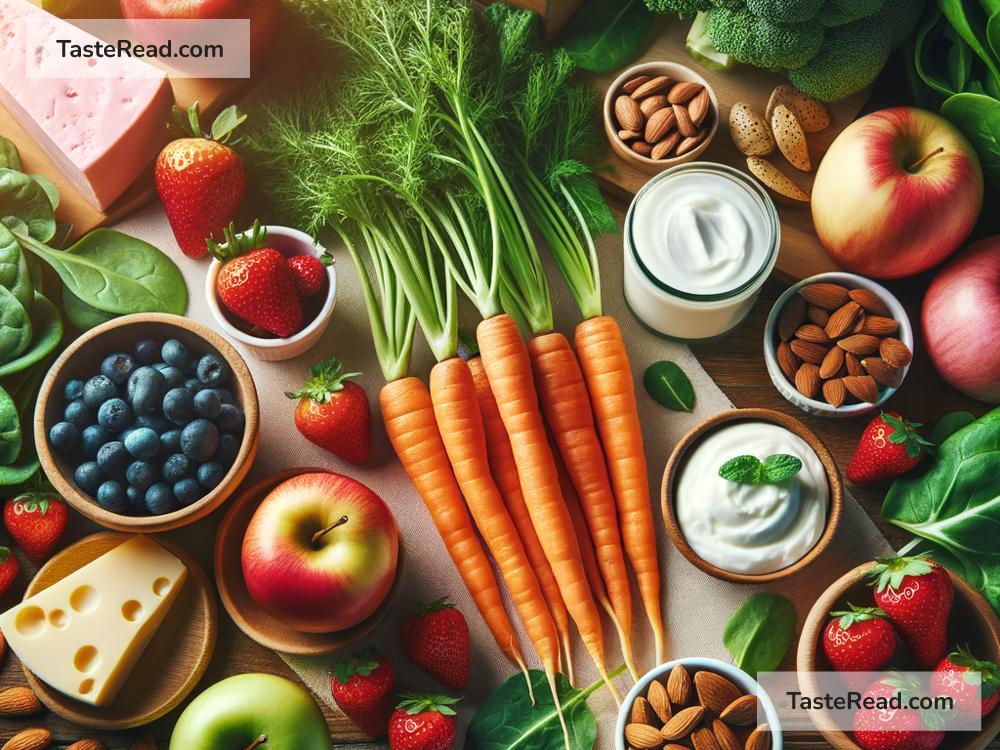Foods That Support Oral Health: Eating Your Way to a Healthy Smile
A healthy smile is more than just brushing and flossing your teeth. Did you know that what you eat can play a big role in your oral health? Many foods help keep your teeth strong, your gums healthy, and your breath fresh. Good oral health is not just about avoiding cavities—it’s also about taking care of your overall well-being! In this blog, we’ll explore the foods that support oral health in simple terms.
Why Food Matters for Oral Health
When you eat or drink something, your teeth and gums come into contact with that food. Sugary and acidic foods can damage your enamel—the outer layer of your teeth—and result in cavities. But the right kinds of food can strengthen your teeth and gums while preventing oral problems. Healthy eating boosts saliva production, provides essential nutrients, and reduces harmful bacteria in your mouth. Let’s dive into some tooth-friendly foods you can add to your diet!
1. Dairy Products: Milk, Cheese, and Yogurt
Dairy products are a superstar when it comes to oral health! They are rich in calcium, which helps make your teeth stronger. Calcium supports your enamel and also keeps your jawbone healthy. Cheese, in particular, is excellent because it increases saliva production. Saliva washes away harmful bacteria, keeping your mouth clean.
If milk or yogurt is part of your daily diet, it’s even better if they’re low in sugar. Plain Greek yogurt is a fantastic choice—it’s packed with protein and probiotics that promote healthy gums.
2. Crunchy Fruits and Vegetables
Crunchy foods like apples, carrots, and celery are great for your teeth. These fruits and veggies require a lot of chewing, which stimulates your gums and increases saliva production. Saliva helps rinse your mouth and reduces harmful bacteria.
Apples are sometimes called “nature’s toothbrush” because their fibrous texture cleans your teeth as you eat them. Celery acts like a natural scraper, removing bits of food stuck between teeth. Plus, fruits and vegetables are packed with vitamins, like vitamin C, which keeps your gums strong and healthy.
3. Leafy Greens: Spinach, Kale, and Lettuce
Leafy green vegetables are loaded with vitamins and minerals that support oral health. They are high in calcium, which strengthens enamel, and folic acid, which promotes healthy gums. Additionally, leafy greens like spinach and kale are low in sugar and naturally clean your teeth while you chew. Try adding a salad, smoothie, or steamed greens to your meals for happy teeth and gums.
4. Nuts and Seeds
Nuts and seeds are not just tasty snacks; they’re filled with nutrients like calcium, phosphorus, and healthy fats that benefit your oral health. Almonds, walnuts, and sunflower seeds, for example, support strong teeth and can help protect your enamel. Their crunchy texture also encourages chewing, which is great for saliva production.
Just remember to go for unsalted or lightly salted options to protect your oral health. Salted or flavored nuts could lead to dehydration or bad breath.
5. Fish and Other Foods Rich in Omega-3s
Fatty fish, like salmon, mackerel, and sardines, are high in omega-3 fatty acids, which reduce inflammation and promote healthy gums. Gum disease is caused by inflammation, so incorporating omega-3-rich foods into your diet can lower your risk. Fish is also full of vitamin D, which helps your body absorb calcium for stronger teeth.
If fish isn’t part of your diet, you can try other omega-3 sources like chia seeds, flaxseeds, and walnuts.
6. Whole Grains
Swap refined grains (like white bread) for whole grains if you want healthier teeth and gums. Whole grains contain essential nutrients, such as fiber and magnesium, which help reduce inflammation in your mouth. Fibrous foods also help prevent gum disease by boosting digestion, keeping bacteria in check, and supporting overall health.
Brown rice, oats, and quinoa are examples of tooth-friendly whole grains. They’re also delicious, filling, and versatile for cooking!
7. Water
Water might not seem like a “food,” but it’s the ultimate oral-health superhero! Drinking plenty of water keeps your mouth hydrated and washes away leftover food particles, sugars, and bacteria. Fluoridated water is even better—it strengthens your teeth and protects them against cavities.
Swap sugary sodas and juices for plain water, especially during meals. Your teeth will thank you!
8. Tea: Green and Black
Green and black teas contain compounds called polyphenols, which fight harmful bacteria in your mouth. They help reduce plaque buildup and freshen your breath. Green tea also has antioxidants that reduce inflammation and prevent gum disease.
Drink tea unsweetened to avoid sugar’s harmful effects on your teeth. Even herbal teas like chamomile can offer some soothing benefits for oral health.
Foods to Limit
While these tooth-friendly foods can do wonders, certain foods and drinks harm your oral health. Limit sugary snacks, candies, sodas, and sticky carbohydrates like chips and cookies. Acidic foods, such as citrus fruits and soda, can wear down your enamel over time. Moderation is key—you don’t need to cut these out completely, but pair them with water and good brushing habits.
Conclusion: Eat Well for Your Smile
What you eat impacts not only your body but also your teeth and gums. Choose calcium-rich dairy, crunchy fruits and veggies, leafy greens, nuts, and fish to improve your oral health naturally. Drink lots of water and stick to whole grains as part of a balanced diet.
Remember, food is only one part of oral care. Brush your teeth twice a day, floss daily, and visit your dentist regularly. By combining good eating habits with good dental hygiene, you’ll maintain a bright, healthy smile for years to come!


